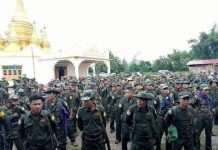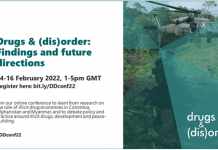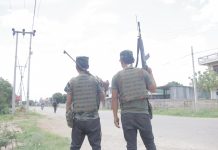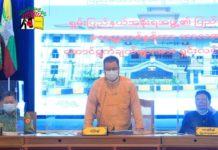Date: 19 January 2015 by Bangkok Post
A couple of major developments have taken place against the backdrop of the battle against drugs. The two cases seem to illustrate the two extremes of this long fight. In Thailand, suit-clad officials from four countries agreed politely to set up an information-sharing headquarters. No one is in charge. The specific goals are not just unstated, but appear not to exist. In Indonesia, at the other end of the pendulum, prison authorities yesterday brought six convicted drug dealers — five of them foreigners — to the killing stakes for execution by firing squad.
The Indonesia action drew predictable protests. In a span of more than 30 years, Southeast Asian countries have executed several hundred people convicted of serious drug offences. Only a tiny handful have been actual traffickers. Most of those hanged, shot or drugged have been “mules”, the lowest ranking of all drug sellers.
The stark truth is clear. Executing low-level drug smugglers and peddlers has not changed anything about the trade. It has not affected the manufacture of drugs, the amount peddled, the attempts to carry it across borders or, in the end, the wholesale or petty peddling of drugs on the streets. Signs at immigration points warning of the possible use of the death penalty for drug offences, and brochures handed out by airlines saying the same, probably have scared some would-be smugglers. But not all of them.
The truth about the death penalty is that it still is threatened, still is sentenced by the courts and still is carried out — although not as often as in the past. Indonesia’s decision last week to send five foreigners and a local to the executioner’s stake is a sign of desperation. Unable to halt drug smuggling, unable to consider a new, better way to fight dangerous drugs, Indonesia merely vents its failure on mules and drug abusers.
The latest faltering step is the four-nation committee, established in Chiang Mai last Thursday. Officials from Thailand, Myanmar, Laos and China call it — of course — a hub against drug trafficking. The target is supposed to be drugs smuggled along and across the Mekong River, which is a long way from Chiang Mai. There is no one in permanent charge of this Safe Mekong Coordination Centre. The head of the office will be different each year, rotated by nationality. And to get everything off to a rather unfortunate start, the Myanmar delegate Myint Thein was allowed to make an unchallenged statement that boiled down to blaming ethnic minorities and countries that produce precursor chemicals for the methamphetamine epidemic.
Drug mules, drug peddlers and drug smugglers are violent criminals. They deserve strong punishment. But the government must know that locking them up is barely noticed by drug merchants. The real enemies of Thai society are inside protected areas of Myanmar. They also are inside our institutions, corrupting government and security forces while directing the smuggling and money laundering on which the drug trade depends.
If governments continue to take the same actions against drug smugglers, including executions, there will be no progress in suppressing the trade. Similarly, if governments respond with more committees like the one formed last week — more “task forces” without strong leadership — there can be no progress in defending society against trafficking. By employing tired old tactics, government is actually throwing up its hands. Without a viable plan to catch and shut down big traffickers, this criminal enterprise will not be stopped.
















Leave a Comments